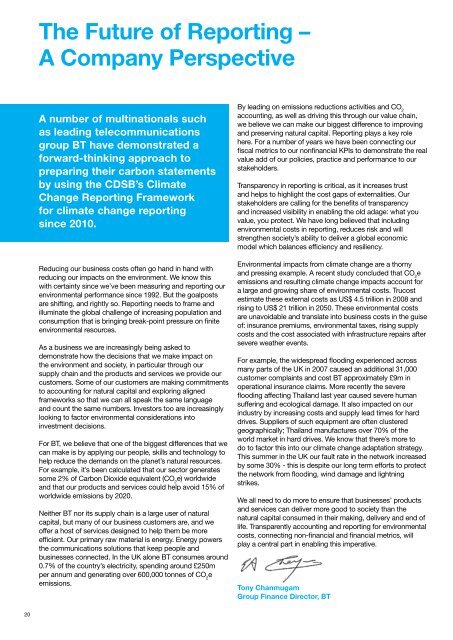CDP-FTSE-350-Climate-Change-Report-2012
CDP-FTSE-350-Climate-Change-Report-2012
CDP-FTSE-350-Climate-Change-Report-2012
Create successful ePaper yourself
Turn your PDF publications into a flip-book with our unique Google optimized e-Paper software.
20<br />
The Future of <strong>Report</strong>ing –<br />
A Company Perspective<br />
A number of multinationals such<br />
as leading telecommunications<br />
group BT have demonstrated a<br />
forward-thinking approach to<br />
preparing their carbon statements<br />
by using the CDSB’s <strong>Climate</strong><br />
<strong>Change</strong> <strong>Report</strong>ing Framework<br />
for climate change reporting<br />
since 2010.<br />
Reducing our business costs often go hand in hand with<br />
reducing our impacts on the environment. We know this<br />
with certainty since we’ve been measuring and reporting our<br />
environmental performance since 1992. But the goalposts<br />
are shifting, and rightly so. <strong>Report</strong>ing needs to frame and<br />
illuminate the global challenge of increasing population and<br />
consumption that is bringing break-point pressure on finite<br />
environmental resources.<br />
As a business we are increasingly being asked to<br />
demonstrate how the decisions that we make impact on<br />
the environment and society, in particular through our<br />
supply chain and the products and services we provide our<br />
customers. Some of our customers are making commitments<br />
to accounting for natural capital and exploring aligned<br />
frameworks so that we can all speak the same language<br />
and count the same numbers. Investors too are increasingly<br />
looking to factor environmental considerations into<br />
investment decisions.<br />
For BT, we believe that one of the biggest differences that we<br />
can make is by applying our people, skills and technology to<br />
help reduce the demands on the planet’s natural resources.<br />
For example, it’s been calculated that our sector generates<br />
some 2% of Carbon Dioxide equivalent (CO 2 e) worldwide<br />
and that our products and services could help avoid 15% of<br />
worldwide emissions by 2020.<br />
Neither BT nor its supply chain is a large user of natural<br />
capital, but many of our business customers are, and we<br />
offer a host of services designed to help them be more<br />
efficient. Our primary raw material is energy. Energy powers<br />
the communications solutions that keep people and<br />
businesses connected. In the UK alone BT consumes around<br />
0.7% of the country’s electricity, spending around £250m<br />
per annum and generating over 600,000 tonnes of CO 2 e<br />
emissions.<br />
By leading on emissions reductions activities and CO 2<br />
accounting, as well as driving this through our value chain,<br />
we believe we can make our biggest difference to improving<br />
and preserving natural capital. <strong>Report</strong>ing plays a key role<br />
here. For a number of years we have been connecting our<br />
fiscal metrics to our nonfinancial KPIs to demonstrate the real<br />
value add of our policies, practice and performance to our<br />
stakeholders.<br />
Transparency in reporting is critical, as it increases trust<br />
and helps to highlight the cost gaps of externalities. Our<br />
stakeholders are calling for the benefits of transparency<br />
and increased visibility in enabling the old adage: what you<br />
value, you protect. We have long believed that including<br />
environmental costs in reporting, reduces risk and will<br />
strengthen society’s ability to deliver a global economic<br />
model which balances efficiency and resiliency.<br />
Environmental impacts from climate change are a thorny<br />
and pressing example. A recent study concluded that CO 2 e<br />
emissions and resulting climate change impacts account for<br />
a large and growing share of environmental costs. Trucost<br />
estimate these external costs as US$ 4.5 trillion in 2008 and<br />
rising to US$ 21 trillion in 2050. These environmental costs<br />
are unavoidable and translate into business costs in the guise<br />
of: insurance premiums, environmental taxes, rising supply<br />
costs and the cost associated with infrastructure repairs after<br />
severe weather events.<br />
For example, the widespread flooding experienced across<br />
many parts of the UK in 2007 caused an additional 31,000<br />
customer complaints and cost BT approximately £9m in<br />
operational insurance claims. More recently the severe<br />
flooding affecting Thailand last year caused severe human<br />
suffering and ecological damage. It also impacted on our<br />
industry by increasing costs and supply lead times for hard<br />
drives. Suppliers of such equipment are often clustered<br />
geographically; Thailand manufactures over 70% of the<br />
world market in hard drives. We know that there’s more to<br />
do to factor this into our climate change adaptation strategy.<br />
This summer in the UK our fault rate in the network increased<br />
by some 30% - this is despite our long term efforts to protect<br />
the network from flooding, wind damage and lightning<br />
strikes.<br />
We all need to do more to ensure that businesses’ products<br />
and services can deliver more good to society than the<br />
natural capital consumed in their making, delivery and end of<br />
life. Transparently accounting and reporting for environmental<br />
costs, connecting non-financial and financial metrics, will<br />
play a central part in enabling this imperative.<br />
Tony Chanmugam<br />
Group Finance Director, BT


